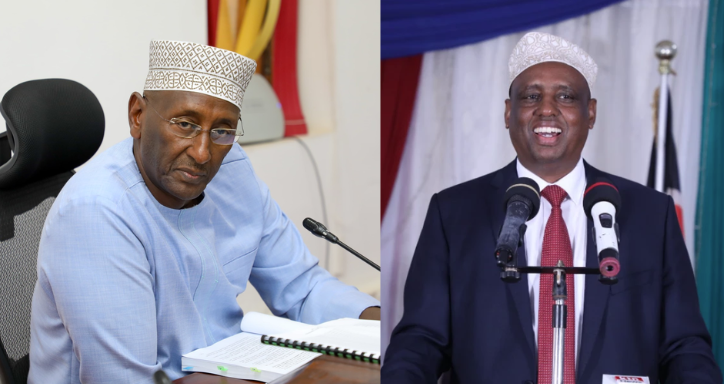Disturbing reports emerging from Marsabit County indicate that county employees across critical sectors, including health, water, Early Childhood Development Education (ECDE), agriculture, and veterinary services, have not received their salaries for June and July 2025, leaving staff facing severe financial hardship, with some unable to meet basic living expenses or pay rent, and many forced to rely on borrowed money to feed their families.

Employees say Governor Ali Mohamud Mohamed has misappropriated funds allocated for salaries, and they describe an atmosphere of fear and intimidation in which ordinary staff feel powerless to question leadership as the governor’s inner circle appears to have consolidated control over county finances, effectively blocking workers from obtaining explanations or advocating for the release of the money owed to them.
The payroll stoppage has translated swiftly into operational collapse across essential services: health facilities report critical staffing shortages and interrupted clinics, ECDE centres struggle to remain open without teachers and support staff, agricultural extension programmes have stalled at the moment farmers most need guidance, and veterinary services lack the personnel to deliver routine livestock care and vaccinations, with residents facing the cascading consequences of paralysed county operations.
Employees further criticise Senator Mohamed Chute for failing in his oversight role, arguing that the senator’s silence and inaction have left county workers with no political avenue to demand accountability and have effectively allowed the crisis to fester without remedy; workers maintain that where oversight should have acted as a check, it has been absent, leaving staff to appeal directly to national authorities for intervention.
Those affected insist this is not an administrative delay but a full-scale humanitarian and labour crisis.
Families are missing meals, children are facing interrupted schooling as teachers are finding it impossible to work without pay, patients are risking delayed care as clinics are operating at reduced capacity, and core programmes that support livelihoods across the county are remaining on hold, exacting a heavy human toll on communities that can least afford it.
Attempts by employees to escalate the crisis internally have met silence, stonewalling, or intimidation, with countless accounts of staff being told there is nothing to be done and fearful of reprisals should they press the matter, leaving workers isolated and compelling them to call for the immediate intervention of national labour offices and the presidency to unlock funds, secure payment, and restore essential services.
“The situation is unbearable; our salaries have been withheld for two months, there is no clarity, no explanation and no avenue for accountability within the county,” one health sector worker told us.
“Many of us are surviving on borrowed money, some colleagues have already lost their homes because they cannot pay rent, and the fear of questioning the governor makes us feel completely powerless.”
Staff from ECDE and agriculture corroborate that service delivery has effectively collapsed in their departments, citing empty classrooms, suspended outreach clinics and stalled field operations, each failure adding to a chorus of community-level harm that the county government must answer for without further delay.
Compounding the labour and service crisis are entrenched corruption investigations that now sit squarely across the governor’s desk.
The Ethics and Anti-Corruption Commission (EACC) recently recommended prosecution in connection with a Ksh 728 million tenders affair and has advanced a wider probe into alleged losses running into billions, with the commission recommending multiple criminal charges, among them conspiracy to commit corruption, and prosecutors pointing to evidence gathered during raids and interviews that have implicated the governor, his close associates and family members.
Earlier in April 2024, Governor Ali Mohamud Mohamed and his predecessor Ukur Yattani were questioned over an alleged loss of Ksh 8 billion spanning 2014 to 2024, and the EACC executed raids that yielded material the commission says will aid ongoing prosecutions.
Those developments, coupled with the commission’s recommendation for prosecution in the tenders case, mean the county’s leadership now faces sustained anti-graft scrutiny even as workers go unpaid.
Despite the intensity of the probes and the public attention they have attracted, the governor has sought to reframe the narrative and reorganise his administration, announcing a sweeping reshuffle in late July 2025 that reassigned county executives and chief officers and installed new names into key portfolios, moves the governor described as grounded in meritocracy, integrity and public interest, while critics see the changes as an attempt to consolidate control amid mounting allegations and to present a veneer of reform without first addressing the most urgent issue: the release of salaries owed to county staff.
The reorganisation placed new faces in strategic roles, including an acting county secretary and a chief of staff in the governor’s office, alongside the reassignment of chiefs to water, education, health, livestock and other vital departments, but workers view the personnel changes as hollow while pay remains withheld and while the EACC’s recommendations and earlier raids continue to cast doubt over the administration’s stewardship of public funds.
Observers say the simultaneity of these events; criminal investigations, an administrative reshuffle, and the withholding of salaries, creates a governance emergency in Marsabit County that demands swift, transparent action.
Salary accounts must be reconciled and cleared, independent forensic scrutiny should be allowed to proceed unimpeded, and national oversight must ensure that county functions resume so that citizens do not continue to bear the cost of political and financial mismanagement.
Workers are urging immediate national intervention to guarantee that the funds allocated for salaries reach their intended recipients, to secure vetting and accountability for procurement and tender awards that the EACC has flagged, and to institute protections so that county employees can report grievances without fear of retaliation.
They have made it clear that their patience has been exhausted and that continued inaction will deepen humanitarian distress across Marsabit.
The unfolding crisis leaves a stark choice for national institutions and political leaders: either step in decisively to restore pay and to enforce accountability at county level, or allow the erosion of public services and public trust to accelerate, with consequences that will extend far beyond internal county politics and that will be felt by the most vulnerable communities across the region.








































